The story today is told by Wang Hongbao (王红宝), who was a member of a team of Chinese diplomats tasked with setting up a liason office in the United States after Nixon’s historical visit to China, to prepare for establishment of formal diplomatic ties between the two countries.
Below is her story. Original link here and here.
Remembering bits and pieces of the setting up of the Liaison Office in the U.S.
Time has flown by, and decades have passed since the establishment of diplomatic relations between China and the United States in 1979. However, the memory of my own experience working at the Chinese Liaison Office in Washington, D.C., before the normalization of diplomatic ties, remains vivid and unforgettable.
Forming the Liaison Office Team
In April 1973, I was in charge of the Norway desk in the Department of Western Europe Affairs of the Ministry of Foreign Affairs①, preparing for the Norwegian Prime Minister’s visit to China. One day, my supervisor told me that after the Norwegian PM’s visit, I would be transferred to the newly established Chinese Liaison Office in Washington. I thought I would have one or two months to prepare for the new role, getting familiar with U.S. affairs. However, after the visit, I returned to Beijing from Guangzhou on May 18 and was immediately informed that I would leave with the mission, led by Ambassador Huang Zhen, for Washington on May 28.
I was both nervous and excited. Firstly, I knew very little about the United States, only what I had read in the newspapers. Secondly, my primary language in the Western Europe Department was Norwegian, with English used less frequently. I was unsure whether I would be able to quickly adapt and perform well in an English-speaking environment.
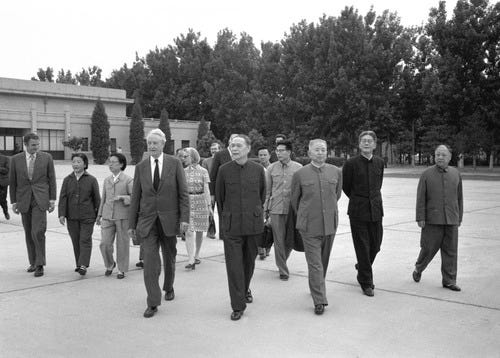
The creation of the Liaison Office was a special arrangement before the normalization of Sino-U.S. relations. In February 1973, during Kissinger's fifth visit to China, the two sides agreed to establish liaison offices in each other's capitals by the end of May 1973. Chairman Mao personally appointed Ambassador Huang Zhen as the head of the office. Before his departure, Huang met with Mao, who emphasized that the Liaison Office was "more of an embassy than an embassy." Typically, an embassy has one ambassador, but both the head and deputy head of the Liaison Office were of ambassadorial rank, underscoring the significance China placed on the office.
As part of the first group of staff accompanying Ambassador Huang Zhen and his wife to Washington, we not only carried our personal luggage but also brought along a considerable amount of office supplies needed for the Liaison Office, including the office’s plaque and national flag. Additionally, we brought valuable art pieces for the living room and reception areas, some of which were special items that Ambassador Huang had requested from the central government and, with Premier Zhou Enlai’s approval, borrowed from the Palace Museum. These included 25 priceless ancient artifacts and art treasures, such as Shang Dynasty bronzeware, Tang Dynasty tri-color pottery, Ming and Qing porcelain, the Along the River During the Qingming Festival painting, as well as works by renowned masters like Xu Beihong and Wu Changshuo.
Because these items were national treasures, we could not have them in check-in luggage. Therefore, we requested the airline's permission to have these pieces as carry-on. During the flight, we took turns every two hours to monitor the safety of the items. We carefully counted the items to ensure none were lost during flight transfers.
A High-Profile Welcome in Washington
On May 29, we arrived in Washington, where a crowd of over 200 people was waiting at the airport to welcome us. U.S. officials, including Deputy National Security Advisor Brent Scowcroft, Deputy Assistant Secretary of State Arthur W. Hummel Jr., and Chief of Protocol Marion H. Smoak, Chief of the China desk, as well as diplomats from friendly nations, were all present to greet the first PRC diplomatic mission to the U.S. Local Chinese Americans were also there to show their support, although due to security reasons, they were kept at a distance.
This was the first time that PRC diplomatic representatives set foot in the U.S. capital, Washington. The welcome was warm and enthusiastic.
The next day, an American friend, Mr. Randolph Clothier Sailer, and his family took it upon themselves to place a full-page ad in The Washington Post to warmly welcome Ambassador Huang and the first team of Chinese diplomats. Many other American friends sent flowers to express their congratulations and well-wishes.
Following recommendations from the U.S. side, the advance team led by Deputy Director Han Xu had already arranged accommodation for us. We stayed at the Mayflower Hotel, one of the best hotels in Washington, located near the White House, major government buildings, and the Capitol. The Mayflower became the first headquarters of the Liaison Office.
My work involved reading the news to Ambassador Huang every morning, covering major newspapers such as The Washington Post, The New York Times, The Wall Street Journal, and The Christian Science Monitor, as well as magazines like Time and U.S. News & World Report. I was also in charge of organizing activities for Ambassador Huang and his wife, Deputy Director Han, sending out diplomatic notices, dealing with correspondence of the director and the deputy director, and serving as personal translator for Zhu Lin, the wife of Huang.
On the afternoon of his arrival, Ambassador Huang had a meeting with Kissinger. That evening, Hummel hosted a dinner at the State Department to welcome him. The next morning, Huang was driven to the White House to meet President Nixon. Besides public talks and photo ops, they had a private conversation for nearly half an hour. Nixon wished Ambassador Huang well in settling down in Washington and briefly explained the name of the Mayflower Hotel: In September 1620, 102 English Puritans, calling themselves "Pilgrims," set sail from England aboard the Mayflower to the North American colonies. The Mayflower was the first ship to carry Puritan immigrants to North America. It symbolizes the beginning of America. Nixon remarked, "Ambassador Huang is also opening up new horizons," to which Ambassador Huang replied, "May the Mayflower blossom for the people of both China and the United States."
July 4th is U.S. Independence Day, the country's National Day. That evening, Kissinger hosted a banquet at the State Department's seventh-floor hall for Ambassador Huang, his wife, Deputy Director Han, and all the staff of the Liaison Office. After the dinner, he invited everyone to watch the fireworks from the State Department's rooftop. Such a unique honor was granted only to the Chinese Liaison Office at that time, highlighting the U.S. side's emphasis on Sino-U.S. relations.
On July 6th, at the invitation of President Nixon, Ambassador Huang and his wife flew on Air Force One to visit the Western White House② in San Clemente, California, accompanied by Kissinger. The Nixons welcomed the Huangs with the warmth and hospitality reserved for friends.
In the first month of Ambassador Huang’s tenure, his schedule was packed with meetings with senior U.S. officials. He visited the Congress to meet with Republican and Democratic leaders from both the Senate and the House, as well as several prominent senators and congressmen. The level of hospitality he received in Washington was unparalleled in the history of U.S. diplomacy, and no other foreign diplomats were treated in such a way. At that time, not only did the head and deputy head of the Liaison Office frequently engage with U.S. White House and State Department officials, but even the counselors and secretaries had regular and friendly exchanges with officials at all levels.
Celebrating the National Day
On October 1, the Liaison Office held its first National Day reception at the Mayflower Hotel. The event was a moment of immense pride for all of us, symbolizing a significant milestone in Sino-U.S. relations. About 500 guests attended, including high-ranking officials such as National Security Advisor and Secretary of State Henry Kissinger, Deputy Secretary of State Kenneth Rush, Deputy National Security Advisor Brent Scowcroft, Assistant Secretary of State Richardson (Possibly John Richardson Jr), Deputy Assistant Secretary of State Arthur W. Hummel, House Speaker Carl Albert, Senate party leaders Michael J. Mansfield and Hugh D. Scott, Jr, Chairmans of the Senate and House Foreign committees and other important U.S. senators such as Jackson (Likely Henry Jackson) and Kennedy (Likely Ted Kennedy), alongside the D.C. mayor and guests of other sectors.
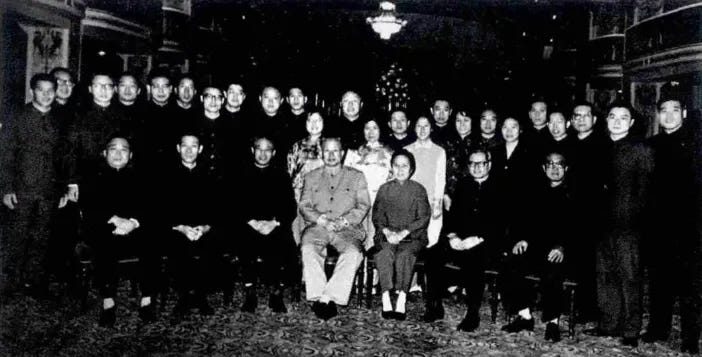
Kissinger once told Ambassador Huang that he did not attend any embassy receptions or banquets because there were more than 150 embassies in Washington, and setting such a precedent would mean he would have to attend events at all of them. Ambassador Huang immediately replied, "We are not an embassy; we are a Liaison Office." Kissinger humorously responded, "I will accept any invitation from the Liaison Office." From then on, Kissinger became a regular guest at the Liaison Office's events.
I also remember an interesting anecdote from that time. The famous Washington journalist Anderson (Possibly Jack Anderson) showed up uninvited. He proactively went to the Mayflower Hotel to attend the reception and interviewed everyone from the hotel owner to the staff, security officers, and even construction workers nearby (those working on the metro construction) to learn about the Chinese staff at the Liaison Office. Later, he wrote an article for the Parade, in which he objectively introduced the new style and image of the Liaison Office's diplomats, praising the excellent conduct of the new Chinese diplomats. The article was well-received by the American public, generating widespread impact across the U.S. Many people, after reading the article, reached out to the Liaison Office to engage with the Chinese diplomats and make friends.
Enjoying Special Treatment
To ensure the safety of the embassy district, police cars patrol the area every day. During the more than seven months of stay of the Chinese Liaison Office at the Mayflower Hotel, the U.S. provided a team of security officers (from the Secret Service, responsible for presidential-level protection), who took turns guarding the hotel 24/7. They also reserved one of the hotel's elevators exclusively for the Liaison Office's use.
Additionally, they connected the floors of the two main residences of the head and deputy head of the Liaison Office with wires and modern equipment, creating a secure link between the upper, middle, and lower floors to prevent intruders from climbing through windows and causing harm. When Liaison Office staff went out, they were always accompanied by security officers. The U.S. also provided a bulletproof car for Ambassador Huang's external activities. When the Liaison Office moved out of the Mayflower Hotel and into its own property, the Windsor Park Hotel, the U.S. removed this level of security, replacing it with two policemen stationed in front of the Liaison Office until the formal establishment of diplomatic relations between China and the U.S., when it officially became an embassy.
The Liaison Office was a special arrangement. Although it wasn't officially an embassy due to the lack of diplomatic relations, it enjoyed all diplomatic privileges and, in many ways, received even more special treatment.
For instance, the U.S. State Department had a rule requiring diplomats and staff of certain embassies (primarily those from socialist countries) to obtain written permission three days in advance from the State Department if they planned to travel more than 25 miles outside Washington, D.C. However, the Chinese Liaison Office only needed to make a verbal request to the State Department’s Protocol Office, which would approve via the phone.
On weekends and public holidays, the U.S. arranged for us to visit and tour Washington's landmarks and nearby historical sites, such as the Gettysburg battlefield, Williamsburg, and Mount Vernon.
The U.S. authorities also frequently screened American films in the corridor of the Mayflower Hotel where we were staying, including programs about American culture like Today in America and National Geographic films about American landscapes, as well as popular movies at the time, such as Love Story, The Godfather, and Murder of De Gaulle. These films not only enriched our cultural life but also helped us learn more about the United States.
The hotel owner, William Hallett (transliteration), was very friendly to us. Knowing that Chinese people love table tennis, he specially bought a ping-pong table and paddles for the Liaison Office and placed them in the corridor. Later, he even cleared out a large room for us to exercise in, hoping that we would enjoy our time at the hotel as if we were in China.
Just before the Liaison Office moved out of the Mayflower Hotel, the hotel owner threw a farewell party for all the staff. Following American customs, he treated everyone to barbecue beef, hot dogs, and had a band play country music. He also gave each person a cowboy hat and a small cloth scarf. The atmosphere was incredibly friendly and warm.
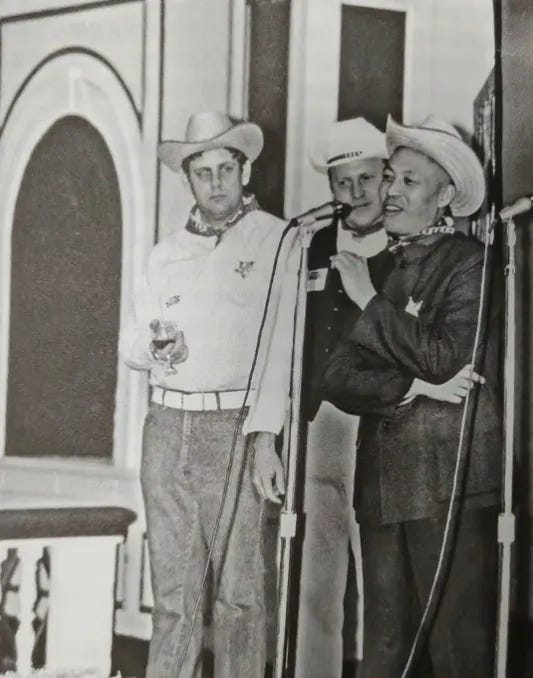
At that time, when Ambassador Huang and his wife returned to China for a debriefing, Deputy Director Han Xu led the staff to attend and presented Chinese handicrafts as a token of appreciation to the hotel owner on behalf of the Liaison Office. The hotel owner also gave Deputy Director Han a business card with his signature, telling him that he could enjoy free steak at any of his steak restaurants③. Additionally, the hotel owner specially nailed a brass plaque on the door of the room where Ambassador Huang and his wife had stayed, commemorating their time there as a permanent memento.
Moving into the Windsor Park Hotel
There was a problem when purchasing the Windsor Park Hotel. According to Washington, D.C.'s Zoning and Planning Act, the height of any building in the city could not exceed the height of the Capitol. The residential area where the Windsor Park Hotel is located, at 2300 Connecticut Avenue, was not allowed to be used for office purposes, and its exterior could not be altered without permission.
To address this, Ambassador Huang and Deputy Director Han met with the mayor of Washington to discuss the matter and requested the mayor's assistance. Fortunately, the mayor was relatively friendly toward China. After patient and friendly negotiations, the Washington City Council finally approved the mayor's explanation. Meanwhile, Zhu Lin, wife of Huang, visited local HOA leaders and several of the key neighbors to conduct friendly neighbor relations work, which helped resolve any objections from the surrounding residents.
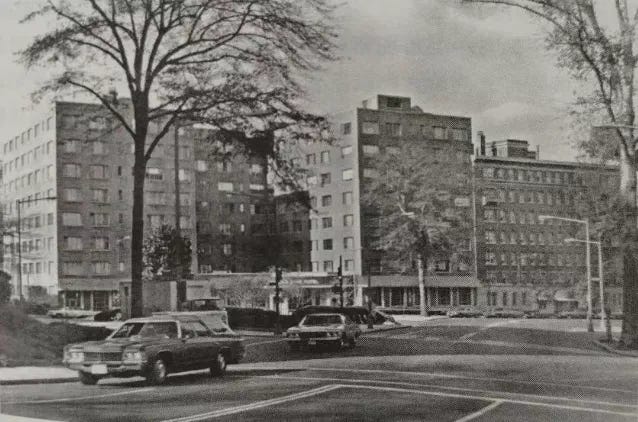
At the end of 1973, after the Liaison Office moved into the newly purchased Windsor Park Hotel, one of the major tasks we faced was how to transform the hotel into a suitable facility for diplomatic work. The construction team sent from China consisted of more than ten people, but only five or six were skilled workers, and the scale of the renovation project was considerable. The manpower was clearly insufficient. In the spirit of hard work and frugality, the leadership of the Liaison Office discussed the matter and engaged all the staff in the decision-making process. After considering various factors, it was decided not to hire local workers and instead to have everyone pitch in and do the work themselves.
All diplomats and staff members took turns participating in physical labor. The transformation of the lobby, entrance hall, banquet hall, and several meeting rooms required knocking down many partition walls, raising the ceiling of the lobby, polishing terrazzo floors, and other tasks, all of which were largely carried out by diplomats and staff members who took turns working. For safety reasons, all windows and doors on the first floor had to be fitted with iron bars. Ambassador Huang personally took part, working alongside the laborers to design the patterns for the iron windows. The iron barriers were both aesthetically pleasing and met safety requirements. The female staff members also played their part, with Zhu Lin leading the effort to paste wallpaper, paint doors and windows, and take on the task of sewing curtains for the entire building.
The backyard of the building was overgrown with weeds and uneven ground. The leadership of the Liaison Office once again rallied everyone, making use of weekends and spare time to clear the weeds and garbage, level the ground, and transform more than half of it into a parking lot and sports field, with a small portion designated as a vegetable garden. In just over a month, the work was completed. This not only improved the environment and solved the parking problem but also created a sports field and a vegetable garden. A staff member from a farming background, who knew how to grow vegetables, voluntarily took responsibility for the gardening tasks. With assistance from other colleagues, vegetables were soon planted in the backyard. Zhu Lin also worked with him, growing mung bean sprouts in the bathtub to supply the kitchen with more vegetables and improve the meals.
When the renovation project was completed, the entire building, inside and out, looked brand new. Some visiting delegations from China who saw the results of the Liaison Office’s self-reliant and hard-working renovation were full of praise, saying, “You’ve turned an old hotel’s dining room into a hall that looks like the Great Hall of the People. It’s not easy!” Many local Americans, hearing about this, also came to visit and expressed their admiration.
In the 1970s, the wage level in China was much lower than it is now. I clearly remember that when I started working at the Liaison Office in May 1973, my monthly salary was just over 30 dollars, which meant I earned only about 1 dollar a day! For people today, this is almost unbelievable. However, at that time, although our wages were very low, everyone was full of enthusiasm, worked joyfully, and was happy. The entire Liaison Office was united, focused, and energetic, like a big revolutionary family.
The Liaison Office only existed for less than six years before it became an embassy, but it truly provided excellent training and improvement for me in various aspects, whether it was foreign languages, diplomatic work skills, or policy knowledge. During this time, I learned a great deal and gained a lot of benefits. It is an experience that I will forever cherish in my life.
Footnotes:
① The department became the Department of European Affairs in 2004.
② La Casa Pacifica
③ According to wikipedia, one of the owners of the hotel at the time was Ulysses "Blackie" Augur, a Washington restaurateur who made a fortune selling beef. It’s possible that the author was referring to Augur.
Beijing Story is a series I started in 2023. It is dedicated to sharing anecdotes of China’s past diplomatic endeavors. If you like this series and would like to see more stories, please like, comment, or share. Thank You!

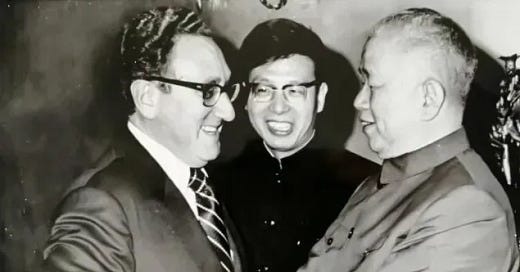

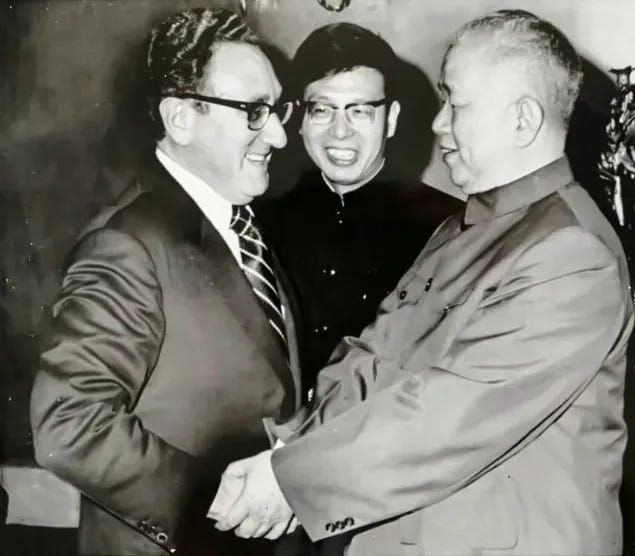
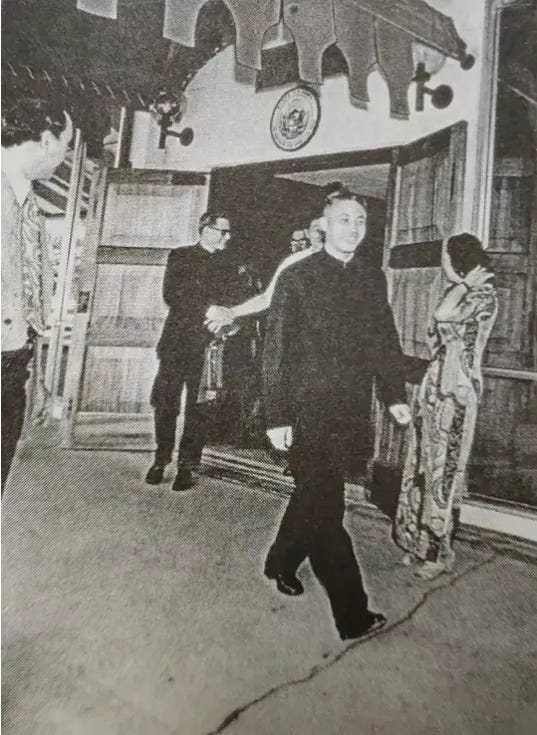
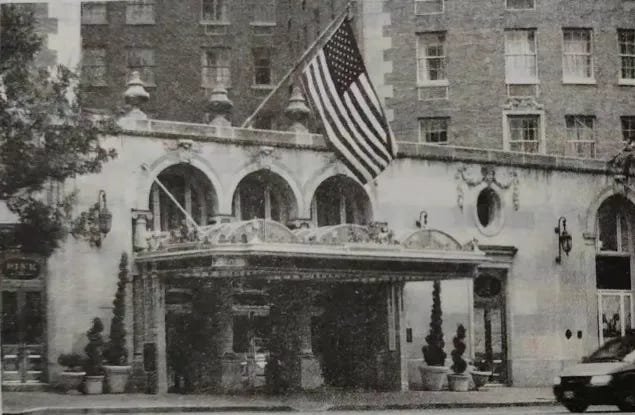
Yes a wonderful story, loved it.
Thank you for a most engaging story.